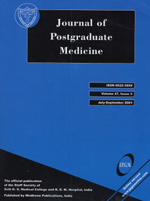
|
Journal of Postgraduate Medicine
Medknow Publications and Staff Society of Seth GS Medical College and KEM Hospital, Mumbai, India
ISSN: 0022-3859
EISSN: 0022-3859
Vol. 49, No. 1, 2003, pp. 25-28
|
 Bioline Code: jp03006
Bioline Code: jp03006
Full paper language: English
Document type: Research Article
Document available free of charge
|
|
|
Journal of Postgraduate Medicine, Vol. 49, No. 1, 2003, pp. 25-28
| en |
Brief Report - Malignant Tumours of the Minor Salivary Glands: A Survival Analysis of 17 Years From a Tertiary Referral Cancer Centre
Pandey M, Thomas S, Mathew A, Nair MK
Abstract
BACKGROUND: Malignant tumours of the minor salivary glands are rare and constitute less than 0.5% of all malignant neoplasms. AIM: This study was carried out to evaluate the clinical presentation, site distribution, treatment, survival and predictors of survival in malignant minor salivary gland tumours. SETTING: A tertiary care, superspeciality referral hospital. DESIGN: Retrospective analysis. PATIENTS AND METHOD: Forty-two cases of minor salivary gland tumours treated over a period of 17 years were reviewed for clinical presentation, histopathology, stage distribution, treatment and treatment outcome. STATISTICAL ANALYSIS: Survival by Kaplan Meier Method and the outcomes were compared using log-rank test. RESULTS: The mean age of the patients was 46.9 years with a male to female ratio of 1.4:1. Majority of the patients presented with a painless progressive swelling, with 13 (31%) of them in T2 stage. About one-third of the patients had palpable lymph nodes at presentation, while none had distant metastasis. Palate was the commonest site and mucoepidermoid carcinoma was the commonest hispathological type. About 1/3 of the patients were treated with primary surgery and were followed up by adjuvant radiotherapy. Seven patients underwent palliative treatment alone. Over a mean follow-up of 30 months, 5 patients failed. The disease free survival was 72% at 5-year, none of the factors studied were found to significantly influence survival. CONCLUSIONS: Results of the present study suggest that minor salivary gland tumours should be treated with primary surgery irrespective of site and histological type to achieve best loco-regional control and survival. (J Postgrad Med 2003;49:25-28)
Keywords
Salivary neoplasm, salivary gland, carcinoma, adenocarcinoma, treatment, survival
|
| |
© Copyright 2003 - Journal of Postgraduate Medicine. Online full text also at http://www.jpgmonline.com
Alternative site location: http://www.jpgmonline.com
|
|
